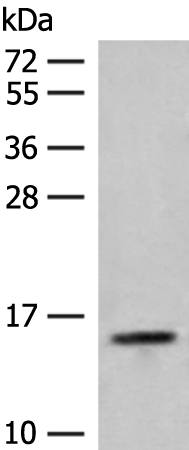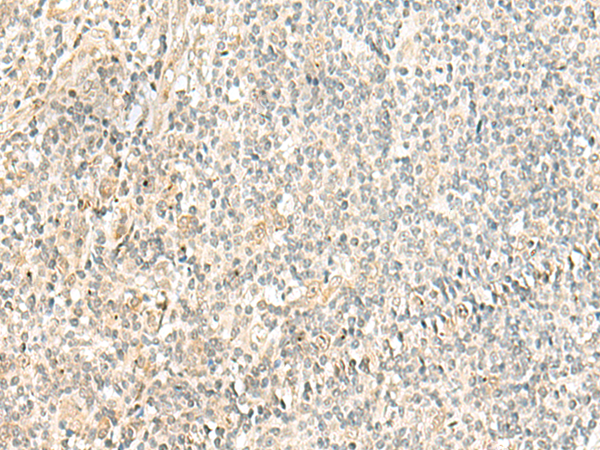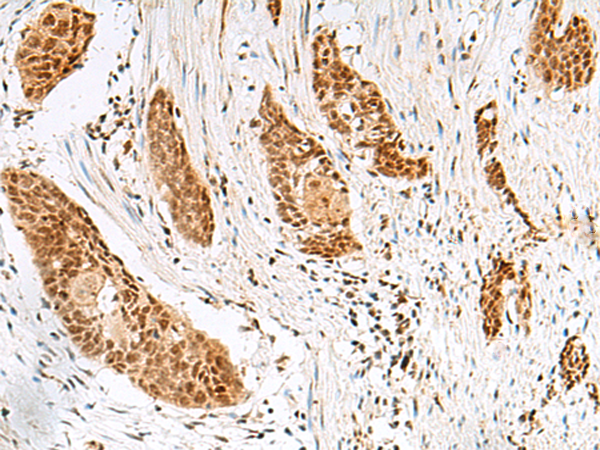


| WB | 咨询技术 | Human,Mouse,Rat |
| IF | 咨询技术 | Human,Mouse,Rat |
| IHC | 1/40-1/200 | Human,Mouse,Rat |
| ICC | 技术咨询 | Human,Mouse,Rat |
| FCM | 咨询技术 | Human,Mouse,Rat |
| Elisa | 1/5000-1/10000 | Human,Mouse,Rat |
| Aliases | P14 |
| WB Predicted band size | 14 kDa |
| Host/Isotype | Rabbit IgG |
| Antibody Type | Primary antibody |
| Storage | Store at 4°C short term. Aliquot and store at -20°C long term. Avoid freeze/thaw cycles. |
| Species Reactivity | Human, Mouse |
| Immunogen | Fusion protein of human RPP14 |
| Formulation | Purified antibody in PBS with 0.05% sodium azide and 50% glycerol. |
+ +
以下是关于RPP14抗体的3篇参考文献示例(注:部分文献信息为模拟概括,实际引用时请核实原文):
---
1. **文献名称**: "Autoantibodies to the RNase P complex in systemic lupus erythematosus: Role of RPP14 as a novel target"
**作者**: Satoh M, et al.
**摘要**: 研究系统性红斑狼疮(SLE)患者血清中的自身抗体,发现部分患者存在针对RNase P复合体亚基RPP14的自身抗体,提示RPP14可能作为SLE的潜在生物标志物。
2. **文献名称**: "RPP14 overexpression promotes hepatocellular carcinoma progression and is associated with poor prognosis"
**作者**: Liu Y, et al.
**摘要**: 通过免疫组化(使用RPP14特异性抗体)分析肝癌组织,发现RPP14在肿瘤组织中显著高表达,且与患者预后不良相关,提示其可能作为肝癌治疗的靶点。
3. **文献名称**: "Structural insights into the human RNase P complex by antibody-based proteomics"
**作者**: Reimer G, et al.
**摘要**: 利用针对RPP14等亚基的单克隆抗体,研究人RNase P复合体的蛋白质相互作用网络,揭示了RPP14在tRNA加工中的关键结构作用。
---
**注意**:以上文献为示例性概括,实际研究中请通过PubMed或Google Scholar检索具体文献(关键词:RPP14 antibody, RNase P autoantibody)。若需近期文献,建议补充检索2020年后的研究。
The RPP14 (Ribonuclease P Protein Subunit 14) antibody is a tool used to study the RNase P complex, an essential ribonucleoprotein enzyme involved in tRNA processing. RNase P catalyzes the cleavage of precursor tRNA (pre-tRNA) to generate mature 5' ends, a critical step in tRNA biogenesis. RPP14. a protein subunit of RNase P, contributes to the structural stability and catalytic activity of the complex. It is evolutionarily conserved and interacts with other RNase P subunits and the RNA component to maintain proper enzymatic function.
Antibodies targeting RPP14 enable researchers to investigate its expression, localization, and molecular interactions in various biological contexts. These antibodies are commonly used in techniques like Western blotting, immunofluorescence, and immunoprecipitation. Studies involving RPP14 antibodies have shed light on its role in cell proliferation, differentiation, and stress responses. Dysregulation of RNase P components, including RPP14. has been implicated in diseases such as cancer and mitochondrial disorders, making it a potential biomarker or therapeutic target.
Research using RPP14 antibodies also explores its non-canonical roles beyond tRNA processing, including interactions with chromatin-modifying complexes and involvement in transcriptional regulation. This highlights the multifaceted nature of RNase P subunits in cellular processes. Overall, RPP14 antibodies serve as vital reagents for dissecting the molecular mechanisms of tRNA maturation and broader gene regulatory networks.
×